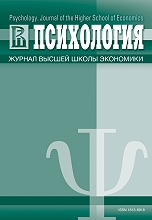Social and Psychological Capital and Acculturation Expectations of the Host Population
Abstract
The objective of the present research was the search of the relationships between various types of trust and acculturation expectations of the host population (according to J. Berry). The theoretical basis of the work was: the conception of social-psychological capital of personality, the theory of social capital and the theory of acculturation by J. Berry. The sample consisted of 111 Russians, 43.3% of which were males, 57.7% were females. Age median was 21 y.o. The participants of the study were asked to fill in questionnaires. The questionnaires allowed to measure three types of trust (generalized, social, institutional), as well as four acculturation expectations (“integration”, “assimilation”, “segregation” and “exclusion”). The empirical data were processed with multiple regression analysis. The results of the study showed that any of the three types of trust were connected to acculturation expectations “assimilation”. With “integration” only social trust was positively connected, while institutional and generalized were not (the hypothesis H1 was supported partially). We didn’t find any negative connections of various types of trust with acculturation expectations “segregation” and “exclusion”. But we found positive links of institutional trust with acculturation expectations, though initially we supposed that these links would be negative. The acquired results are discussed in the article, and the explanation is given to the nature of these interactions, which initially we were not supposed to receive.
Downloads
References
2. Купрейченко, А.Б. (2008). Психология доверия и недоверия.М.: Изд-во «Институт психологии РАН».
3. Лебедева, Н.М., Татарко, А.Н. (2009). Стратегии межэтнического взаимодействия мигрантов и населения России. М.: РУДН.
4. Левада-центр. (2015). Динамика доверия политическим институтам. Режим доступа: http://www.levada.ru/2016/10/13/institutsionalnoe-doverie-2
5. Поршнев, Б. Ф. (2010). Контрсуггестия и история (Элементарное социально-психологическое явление и его трансформация в развитии человечества). Историческая психология и социология истории, 3(2), 185-219.
6. Татарко, А. Н. (2014). Социально-психологический капитал личности в поликультурном обществе. М.: Изд-во «Институт психологии РАН».
7. Татарко, А. Н., Миронова, А. А., Чувашов, С. В. (2015). Влияние культурного многообразия на социальный капитал в российском контексте. Общественные науки и современность, 3, 47-62.





